- Home
- Albert Camus
A Happy Death Page 3
A Happy Death Read online
Page 3
The next day, departing from her usual practice, she came to his room after she had left the office. She found Mersault asleep and sat down at the foot of the brass bed without waking him. He was in his shirtsleeves, which exposed the white underside of his muscular brown forearms. He was breathing regularly, chest and belly rising together. Two creases between his eyebrows gave him a look of strength and stubbornness she knew very well. His hair curled around his tanned forehead, in which a vein throbbed. Exposed this way, his arms lying close to
his sides, one leg bent, he looked like a solitary and obstinate god, flung sleeping into an alien world. Staring at his sleep-swollen lips, she desired him, and just then Mersault half-opened his eyes and closed them again, saying without anger: "I don't like being watched when I'm sleeping."
Marthe threw her arms around his neck and kissed him. He didn't move. "Oh, darling, another one of your moods . . ."
"Don't call me 'darling,' please. I've already asked you not to."
She stretched out beside him and stared at his profile. "You remind me of someone that way, I wonder who it is."
He pulled up his trousers and turned his back to her. Marthe frequently noticed Mersault's gestures in strangers, in film actors; he took it as a sign of his influence over her, but now this habit which had often flattered him was an irritation. She squeezed herself against his back and took all the warmth of his sleep against her body. Darkness was falling fast, and shadows soon filled the room. Somewhere in the building there were shouts, children crying, a cat mewing, the sound of a door slamming. The street-lamps came on, flooding the balcony. Streetcars went by occasionally. And then the neighborhood smell of anisette and roasting meat rose in heavy gusts from the street into the room.
Marthe felt sleepy. "You're mad at me, aren't you? It started yesterday . . . that's why I came. Aren't you going to talk to me?" She shook him.
Mersault didn't move, his eyes tracing the curve ef light on a shoe under the dressing table: it was already dark in the room. "You know that man yesterday? Well, I was just kidding. He was never my lover."
"No?"
"Well, not really."
Mersault said nothing. He could see the gestures so clearly, the smiles ... He clenched his teeth. Then he got up, opened the windows, and sat down again on the bed. Marthe pressed against him, thrust her hand between two buttons of his shirt and caressed his nipples. "How many lovers have you had?" he said finally.
"Don't be like that."
Mersault said nothing.
"Maybe ten," she said.
With Mersault sleepiness always called for a cigarette, "Do I know them?" he asked as he took one out. All he could see now was a white patch where Marthe's face was. "It's the same as when we make love," he realized.
"Some of them. Around here." She rubbed her face against his shoulder and spoke in that little girl's voice she used to make Mersault treat her gently.
"Now listen to me," he said, lighting a cigarette. "Try to understand what I'm saying. Promise to tell me their names. And I want you to promise to point out the others—the ones I don't know—if we pass them in the street."
Marthe pulled away. "Oh no!"
A car sounded its horn right under the windows, then again, then twice more—long, fierce blasts. A streetcar bell sounded somewhere in the night. On the marble top of the dressing table, the alarm clock ticked coldly. Mersault spoke with deliberation: "I'm asking you to tell me because I know myself. If I don't find out exactly who they are, each man I meet will make the same thing happen—I'll wonder, I'll imagine. That's what it is, I'll imagine too much. I don't know if you understand . . ."
She understood, amazingly. She told him the names. There was only one he didn't recognize. The last she named was a man he knew, and this was the one he thought about, because he was handsome and the women ran after him. What astonished him about lovemaking was—the first time, at least—the terrible intimacy the woman accepted and the fact that she could receive a part of a stranger's body inside her own. In such intoxication and abandonment, in such surrender he recognized the exalting and sordid power of love. And it was this intimacy that was the first thing he imagined between Marthe and her lover. Just then she sat up on the edge of his bed and putting her left foot on her right thigh, took off one shoe, then the other, dropping them next to the bed so that one was lying on its side, the other-standing on its high heel. Mersault felt his throat tighten. Something was gnawing at his stomach.
"Is this the way you do it with Rene?" he said smiling.
Marthe looked up. "Don't get any funny ideas," she said. "We only did it once."
"Oh."
"Besides, I didn't even take my shoes off."
Mersault stood up. He saw her lying back, all her clothes on, on a bed like this one, and surrendering everything, unreservedly. He shouted, "Shut up!" and walked over to the balcony.
"Oh darling!" Marthe said, sitting on the bed, her stocking feet on the floor.
Mersault controlled himself by watching the streetlamps glitter on the tracks. He had never felt so close to Marthe. And realizing that at the same time he was letting her come a little closer to him, he felt pride making his eyes sting. He walked back to her and pinched the warm skin of her neck under one ear. He smiled. "And that Zagreus—who's he? He's the only one I don't know."
"Oh him," Marthe said with a laugh, "I still see him." Mersault pinched harder. "He was the first one, you have to understand that. I was just a kid. He was older. Now he's had both legs amputated. He lives all alone. So I go see him sometimes. He's a nice man, and educated. He still reads all the time—in those days he was a student. He's always making jokes. A character. Besides, he says the same thing you do. He tells me: 'Come here, image.' "
Merault was thinking. He let go of Marthe, and she fell back on the bed, closing her eyes. After a moment he sat down beside her and bent over her
parted lips, seeking the signs of her animal divinity and the way to forget a suffering he considered unworthy. But he did nothing more than kiss her.
As he walked Marthe home, she talked about Zagreus: "I've told him about you. I told him my darling was very handsome and very strong. Then he said he'd like to meet you. Because—this is what he said: The sight of a good body helps me breathe.'"
"Sounds pretty crazy."
Marthe wanted to please him, and made up her mind this was the moment to stage the little scene of jealousy she had been planning, having decided she owed it to him somehow. "Oh, not so crazy as some of your friends."
"What friends?" Mersault asked, genuinely startled.
"Those little grinds . . ."
The little grinds were Rose and Claire, students in Tunis whom Mersault used to know and with whom he maintained the only correspondence in his life. He smiled and laid his hand on the nape of Marine's neck. They walked a long time. Marthe lived near the parade grounds. Lights shone in all the upper windows of the long street, although the dark, shuttered shopwindows had a forbidding look.
"Listen, darling, you don't happen to be in love with those little grinds by any chance, do you?"
"No."
They walked on, Mersault's hand on Marthe's neck covered by the warmth of her hair.
"Do you love me?" Marthe asked suddenly.
Mersault burst out laughing. "Now that's a serious question."
"Answer me!"
"People don't love each other at our age, Marthe— they please each other, that's all. Later on, when you're old and impotent, you can love someone. At our age, you just think you do. That's all it is."
Marthe seemed sad, but he kissed her. "Goodnight, darling," she said. Mersault walked home through the dark streets. He walked quickly, aware of how the muscles in his thighs played against the smooth material of his trousers, and he thought of Zagreus and his amputated legs. He wanted to meet him, and decided to ask Marthe to introduce them.
The first time Mersault saw Zagreus, he was annoyed. Yet Zagreus had tried to avoid anything
that might be embarrassing about two lovers of the same woman meeting in her presence. To do so, he had attempted to make Mersault his accomplice by calling Marthe a "good girl" and laughing very loud. Mersault had remained impassive. He told Marthe, as soon as they were alone, how much he had disliked the encounter.
"I don't like half-portions. It bothers me. It keeps me from thinking. And especially half-portions who brag."
"Oh you and your thinking," Marthe answered, not understanding. "If I paid any attention to you . . ."
But later, that boyish laugh of Zagreus', which had at first annoyed him caught Mersault's attention and interest. Moreover, the obvious jealousy which had provoked Mersault's first judgment had disappeared as soon as he saw Zagreus. Once when Marthe quite innocently referred to the time she had known Zagreus, he advised her: "Don't bother. I can't be jealous of a man who doesn't have his legs any more. If I ever do think about the two of you, I see him like some kind of big worm on top of you. And it just makes me laugh. So don't bother, angel."
And after that he went back to visit Zagreus by himself. Zagreus talked a great deal and very fast, laughed, then fell silent. Mersault felt comfortable in the big room where Zagreus lived surrounded by books and Moroccan brass trays, the fire casting reflections on the withdrawn face of the Khmer Buddha on the desk. He listened to Zagreus. What he noticed about the cripple was that he thought before he spoke. Besides, the pent-up passion, the intense life animating this absurd stump of a man, was enough to attract Mersault, to produce in him something which, if he had been a little less guarded, he might have taken for friendship.
4
That Sunday afternoon, after talking and laughing a great deal, Roland Zagreus sat silent near the fire in his big wheelchair, wrapped in white blankets. Mersault was leaning against a bookshelf, staring at the sky and the landscape through the white silk curtains. He had come during a light rain and, not wanting to arrive too early, had spent an hour wandering around the countryside. The day was dark, and even without hearing the wind, Mersault could see the trees and branches writhing silently in the little valley. The silence was broken by a milk wagon, which trundled down the street past the villa in a tremendous racket of metal cans. Almost immediately the rain turned into a downpour, flooding the windowpanes. All the water like some thick oil on the panes, the faint hollow noise of the horse's hoofs—more audible now than the cart's uproar— the persistent hiss of the rain, this basket case beside the fire, and the silence of the room—everything seemed to have happened before, a dim melancholy past that flooded Mersault's heart the way the rain had soaked his shoes and the wind had pierced the thin material of his trousers. A few moments before, the falling vapor—neither a mist nor a rain—had washed his face like a light hand and laid bare his dark-circled eyes. Now he stared at the black clouds that kept pouring out of the sky, no sooner blurred
than replaced. The creases in his trousers had vanished, and with them the warmth and confidence of a world made for ordinary men. He moved closer to the fire and to Zagreus and sat facing him, in the shadow of the high mantelpiece and yet within sight of the sky. Zagreus glanced at Mersault, then looked away and tossed into the fire a ball of paper he had crumpled in his left hand. The gesture, as always ridiculous, disconcerted Mersault: the sight of this mutilated body made him uneasy. Zagreus smiled but said nothing, then suddenly thrust his face toward Mersault. The flames gleamed on his left cheek only, but something in his voice and eyes was filled with warmth. "You look tired," he said.
Abashed, Mersault merely answered: "Yes, I don't know v/hat to do," and after a pause straightened up, walked to the window, and added as he stared outside: "I feel like getting married, or committing suicide, or subscribing to L'Illustration. Something desperate, you know."
Zagreus smiled. "You're a poor man, Mersault. That explains half of your disgust. And the other half you owe to your own submission to poverty."
Mersault kept his back turned, staring at the trees in the wind. Zagreus smoothed the blanket over his legs.
"You know, a man always judges himself by the balance he can strike between the needs of his body and the demands of his mind. You're judging yourself now, Merasult, and you don't like the sentence.
You live badly. Like a barbarian." He turned his head toward Patrice: "You like driving a car, don't you?"
"Yes."
"You like women?"
"When they're beautiful."
"That's what I meant." Zagreus turned back to the fire. After a moment, he began: "All those things . . ." Mersault turned around, leaning against the window, which yielded slightly to his weight, and waited for the rest of the sentence. Zagreus remained silent. A fly buzzed against the glass. Mersault turned, caught it under his hand, then let it go. Zagreus watched him and said, hesitantly: "I don't like talking seriously. Because then there's only one thing to talk about—the justification you can give for your life. And I don't see how I can justify my amputated legs."
"Neither do I," Mersault said without turning around.
Zagreus' young laugh suddenly burst out. "Thanks. You don't leave me any illusions." He changed his tone: "But you're right to be hard. Still, there's something I'd like to say to you." And he broke off again. Mersault came over and sat down, facing him. "Listen," Zagreus resumed, "and look at me. I have someone to help me, to set me on the toilet, and afterwards to wash me and dry me. Worse, I pay someone for it. Yet I'll never make a move to cut short a life I believe in that much
. . . I'd accept even worse—blind, dumb, anything, as long as I feel in my belly that dark fire that is me, me alive. The only thing that would occur to me would be to thank life for letting me burn on." Za-greus flung his body back in the chair, out of breath. There was less of him to see now, only the whitish reflection the blankets left on his chin. Then he went on: "And you, Mersault, with a body like yours, your one duty is to live and be happy."
"Don't make me laugh," Mersault said. "With eight hours a day at the office. Oh, it would be different if I was free!" He grew excited as he spoke, and as occasionally happened, hope flooded him once more, even more powerfully today because of Zagreus' reassurance. He believed that at last he could confide in someone. He resisted the impulse for a moment, began to stub out a cigarette, then continued more calmly: "A few years ago I had everything before me—people talked to me about my life, about my future. And I said yes. I even did the things you had to do to have such things. But even back then, it was all alien to me. To devote myself to impersonality—that's what concerned me. Not to be happy, not to be 'against.' I can't explain it, but you know what I mean."
"Yes," Zagreus said.
"Even now, if I had the time ... I would only have to let myself go. Everything else that would happen to me would be like rain on a stone. The stone cools off and that's fine. Another day, the sun
bakes it. I've always thought that's exactly what happiness would be."
Zagreus had folded his hands to come down twice as hard, and the clouds swelled in a vague mist. The room grew a little darker, as if the sky was pouring its burden of shadow and silence into it. And the cripple said intensely: "A body always has the ideal it deserves. That ideal of a stone—if I may say so, you'd have to have a demigod's body to sustain it."
"Right," Mersault said, a little surprised, "but don't exaggerate—I've done a lot of sports, that's all. And I'm capable of going quite far in pleasure."
Zagreus reflected. "Yes—so much the better for you. To know your body's limits—that's the true psychology. But it doesn't matter anyway. We don't have time to be ourselves. We only have time to be happy. But would you mind defining what you mean by impersonality?"
"No," Mersault said, but that was all.
Zagreus took a sip of tea and set down his full cup. He drank very little, preferring to urinate only once a day. He willed himself to reduce the burden of humiliations each day brought him. "You can't save a little here, a little there," he had told Mersault one day. "It's a record like
any other." For the first time a few raindrops fell down the chimney. The fire hissed. The rain beat harder on the win-dowpanes. Somewhere a door slammed. On the road, automobiles streaked by like gleaming rats.
One of them blew its horn, and across the valley the hollow, lugubrious blast made the wet space of the world even larger, until its very memory became for Mersault an element of the silence and the agony of that sky.
"I'm sorry, Zagreus, but it's been a long time since I talked about certain things. So I don't know any more—or I'm not sure. When I look at my life and its secret colors, I feel like bursting into tears. Like that sky. It's rain and sun both, noon and midnight. You know, Zagreus, I think of the lips I've kissed, and of the wretched child I was, and of the madness of life and the ambition that sometimes carries me away. I'm all those things at once. I'm sure there are times when you wouldn't even recognize me. Extreme in misery, excessive in happiness—I can't say it."
"You're playing several games at the same time?"
"Yes, but not as an amateur," Mersault said vehemently. "Each time I think of that flood of pain and joy in myself, I know—I can't tell you how deeply I know that the game I'm playing is the most serious and exciting one of all."
Zagreus smiled. "Then you have something to do?"
Mersault said vehemently: "I have my living to earn. My work—those eight hours a day other people can stand—my work keeps me from doing it." He broke off and lit the cigarette he had held till now between his fingers. "And yet," he said, the
match still burning, "if I was strong enough, and patient enough . . ." He blew out the match and pressed the tip against the back of his left hand. "... I know what kind of life I'd have. I wouldn't make an experiment out of my life: I would be the experiment of my life. Yes, I know what passion would fill me with all its power. Before, I was too young. I got in the way. Now I know that acting and loving and suffering is living, of course, but it's living only insofar as you can be transparent and accept your fate, like the unique reflection of a rainbow of joys and passions which is the same for everyone."

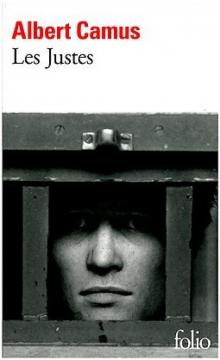 Les Justes
Les Justes The Sea Close By
The Sea Close By The Stranger
The Stranger The Rebel: An Essay on Man in Revolt
The Rebel: An Essay on Man in Revolt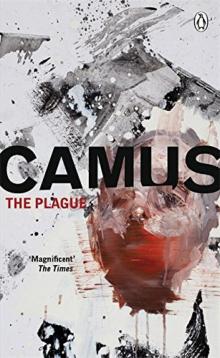 The plague
The plague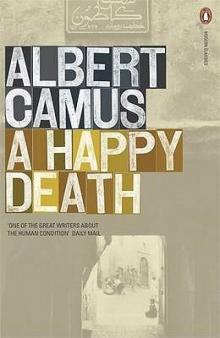 A Happy Death
A Happy Death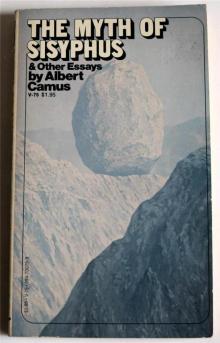 The Myth of Sisyphus and Other Essays
The Myth of Sisyphus and Other Essays The Fall
The Fall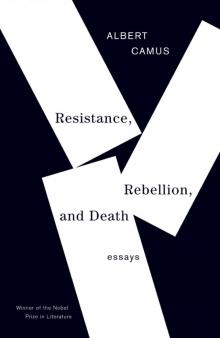 Resistance, Rebellion, and Death
Resistance, Rebellion, and Death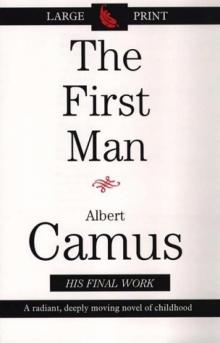 The First Man
The First Man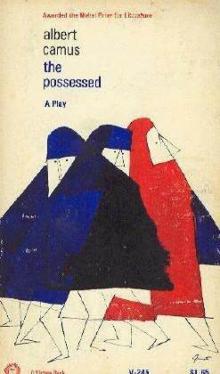 The Possessed
The Possessed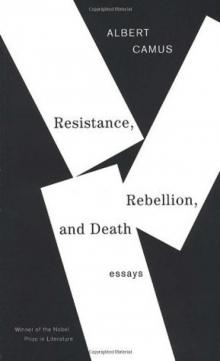 Resistance, Rebellion and Death: Essays
Resistance, Rebellion and Death: Essays